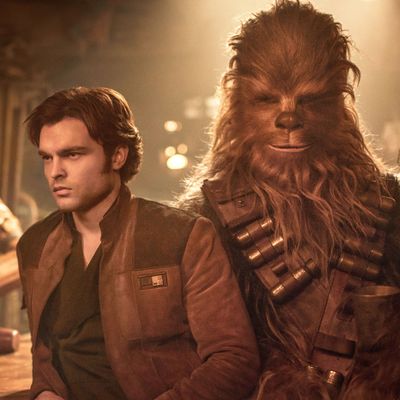
The Force wasn’t strong with this one. The Millennium Falcon failed to achieve liftoff. That is to say, Solo: A Star Wars Story, the stand-alone prequel to the reliably blockbuster Galaxy Far Far Away franchise, arrived well short of financial expectations over its opening weekend in theaters. Estimated by prerelease “tracking” reports to pull in as much as $150 million over its four-day Memorial Day weekend bow, the sci-fi thriller yielded a mere $101 million, according to ComScore, to become the lowest-grossing first weekend for a Star Wars installment (adjusted for inflation) to date. Even worse, in an era when surging overseas ticket sales have taken up the slack for Hollywood’s domestic movie misfires, the prequel — which cost around $400 million to make and market — only delivered $68.2 million in foreign box-office receipts.
Under normal circumstances, any opening above $100 million would be cause to break out Champagne on the back lot. But Star Wars is Disney’s premium product and Solo is showing every indication of underperforming previous franchise installments. So what happened?
Bad word of mouth
Attempting to satisfy die-hard Star Wars aficionados while wooing younger filmgoers with the Dickensian origin story of franchise fan favorite Han Solo, the film didn’t make the jump to light speed with many critics, clocking a lackluster 70 percent on Rotten Tomatoes. And arriving on the heels of December’s less-than-ecstatically received Star Wars: The Last Jedi — amid a hive of negative buzz about Solo’s legendarily troubled production — some fans viewed the “space Western” as a cynical exercise in franchise expansion, with some diehards even actively rooting for Solo’s floppage.
Multiplex gridlock
The movie had the misfortune to hit multiplexes just one week after the juggernaut opening weekend of Deadpool 2 (which has racked up $207.4 million to date) and in the long wake of one of 2018’s most successful movies, Avengers: Infinity War ($622 million after five weeks in theaters) — two splashy blockbusters widely seen as eating into Solo’s intended fanboy audience. With hindsight being 20/20, box-office analysts have also questioned Disney’s decision to release the movie amid the summer’s crowded popcorn marketplace as opposed to the franchise’s typical late December frame, when such installments as Rogue One: A Star Wars Story, The Force Awakens, and The Last Jedi did much bigger business, each opening to more than $155 million domestically.
“You have three movies basically vying for the same audience,” says Paul Dergarabedian, senior media analyst for ComScore. “That’s a tough market to compete in.”
Franchise fatigue?
Time was when Star Wars films were few and far between; prior to the 2015 release of The Force Awakens, there hadn’t been a live-action installment in ten years. And from 1977 to 2005, a total of six Star Wars movies reached the big screen. In what amounts to a kind of high-profile experiment for Disney, however, Solo hits theaters just five months after The Last Jedi receded from them. And a time when Lucasfilm recently announced stand-alone Obi-Wan Kenobi and Boba Fett films, even Star Wars’ fan faithful have been saying it’s too much too soon.
Disney’s president of worldwide distribution, Dave Hollis, cautioned against the f-word, however, pointing out the Marvel Cinematic Universe’s ability to deliver blockbuster hits just about every six months. “We’re in a world where we’re in the same conference rooms planning Marvel movies,” he told Deadline, adding: “We have a Thor and a Black Panther and an Infinity War coming out in November and February and May and each are massively successful. They each do well and people are not asking these questions.”
Dergarabedian does not accept the franchise-fatigue argument, but reasons the narrow window since the series’ last installment figures prominently into Solo’s financial underperformance. “Each Star Wars movie looms so large in the minds of the fans, Solo coming just five months after the release of The Last Jedi is definitely a factor,” he says. “There may be audience members who only saw it a couple of months ago. And here’s another Star Wars movie! People have a limited pocketbook a lot of the time. If you look at MPAA stats, people don’t go to the movies every weekend. It’s a time commitment, it’s a money commitment. And if you just saw Infinity War and Deadpool 2, and now comes Solo, that’s a lot of product aimed at the same group.”


